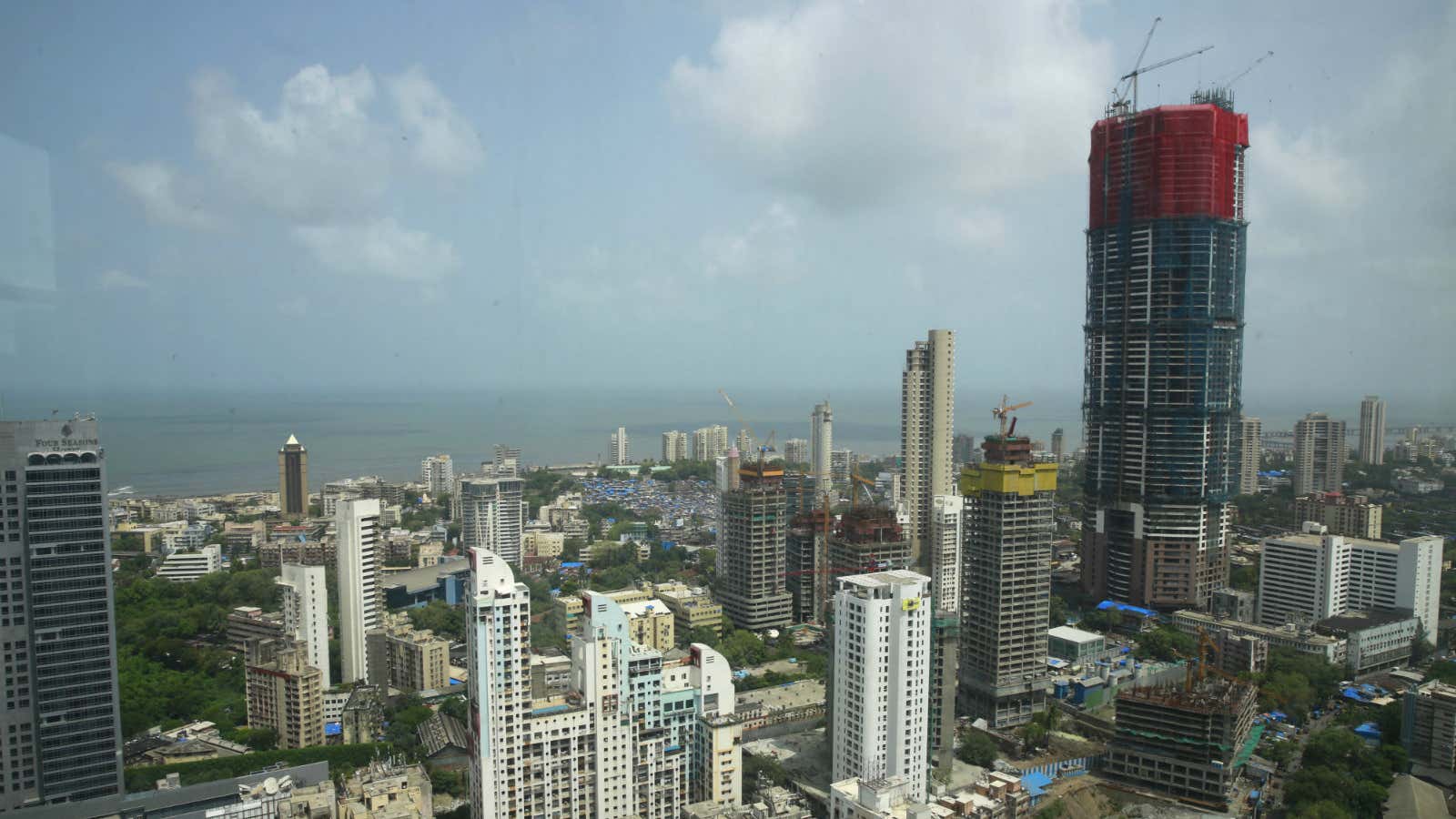Wall Street is betting big on India’s real estate sector.
In the last few months, global giants including Goldman Sachs, Warburg Pincus and Blackstone have invested over Rs6,000 crore ($910 million) in Indian real estate firms, even as the sector groans under debt and stalling sales.
In all, total private equity inflows—both domestic and foreign—into real estate in 2015 are already at levels not seen since 2011.
All these funds come after years of subdued private equity investments in real estate, when money was stuck in projects that were either delayed or simply failed to take off.
“The sentiments had started improving right after the results of general elections in 2014,” Anuj Puri, chairman and country head of JLL India, a real estate consultancy, told Quartz via email. ”While transparency still remains a challenge to be addressed, underlying demand continues to be huge.”
Big bets
On Aug. 17, Goldman Sachs invested $150 million (Rs900 crore) (pdf) in Piramal Realty—the real estate development arm of the Piramal Group—for a minority stake in the company. In July, Piramal Realty raised (pdf) Rs1,800 crore from another US private equity firm, Warburg Pincus.
In May, Goldman Sachs partnered with Nitesh Estates, a Bengaluru-based real estate firm, to invest up to $250 million (Rs1,600 crore) in income-producing assets in India.
“The government’s focus on simplifying regulation and boosting economic growth will kick-start investment and consumption,” Ankur Sahu, co-head of private equity at Goldman Sachs in Asia, said in a statement (pdf) on Aug. 17.
Earlier in June, Blackstone—the American private equity major and India’s largest owner of commercial real estate—acquired the 247 Park Office project in Mumbai for Rs1,060 crore ($160 million). In early August, it tied up with the Panchshil Group to invest around Rs750 crore to develop an information technology special economic zone in Pune.
These inflows are a far cry from the last couple of years when investors shied away from India’s real estate sector, which is estimated to be worth $180 billion (Rs11.9 lakh crore) by 2020.
“The global financial crisis had its effect across the world, and India was no exception. The real estate sector, which enjoyed superb interest from the foreign investors, was severely hit and this affected the exit routes—a scenario which continued for a few years,” JLL’s Puri said.
Investors have now also become more alert while choosing partners and projects. There is a stricter due diligence process and every step is dealt with caution.
“Investors have learnt from their mistakes in the past,” said Shashank Jain, partner, transaction services and real estate deals leader at PwC India. ”No longer we are seeing investors chase all deals—they are investing in projects where they can monitor the work.”
Challenges remain
On Sept. 1, credit ratings agency Moody’s said that India’s largest property developers will continue to face a challenging operating environment over the next 12 months—including weak cash flows, flat sales and stagnant prices.
“The ability of developers to execute projects across markets has been challenged in the past two to three fiscal years owing to delayed approvals and stretched liquidity,” the agency said in a statement.
“Such delays have slowed the flow of payments from homebuyers and reduced investor demand for new projects by locking up their capital and decreasing their expected returns,” it added.
In July, Ambit, a domestic brokerage, also warned that the sector could be staring at a slowdown.
“We are seeing a broad-based real estate pullback, with prices correcting in most tier I and tier II cities alongside sharp drops in transaction and new launch volumes. The drivers for this slowdown are a mix of supply-side factors (banks have pulled back lending to developers) and demand-side factors (the black money bill has created fear amongst speculators),” the Ambit report said (pdf).
In spite of the red flags, Wall Street and investors elsewhere are convinced that the sector still holds promise.
“The inherent Indian demographics still makes the country’s real estate sector attractive. But if you are looking at short-term gains, then that continues to be a challenge,” PwC’s Jain said. “The long-term story is intact.”
